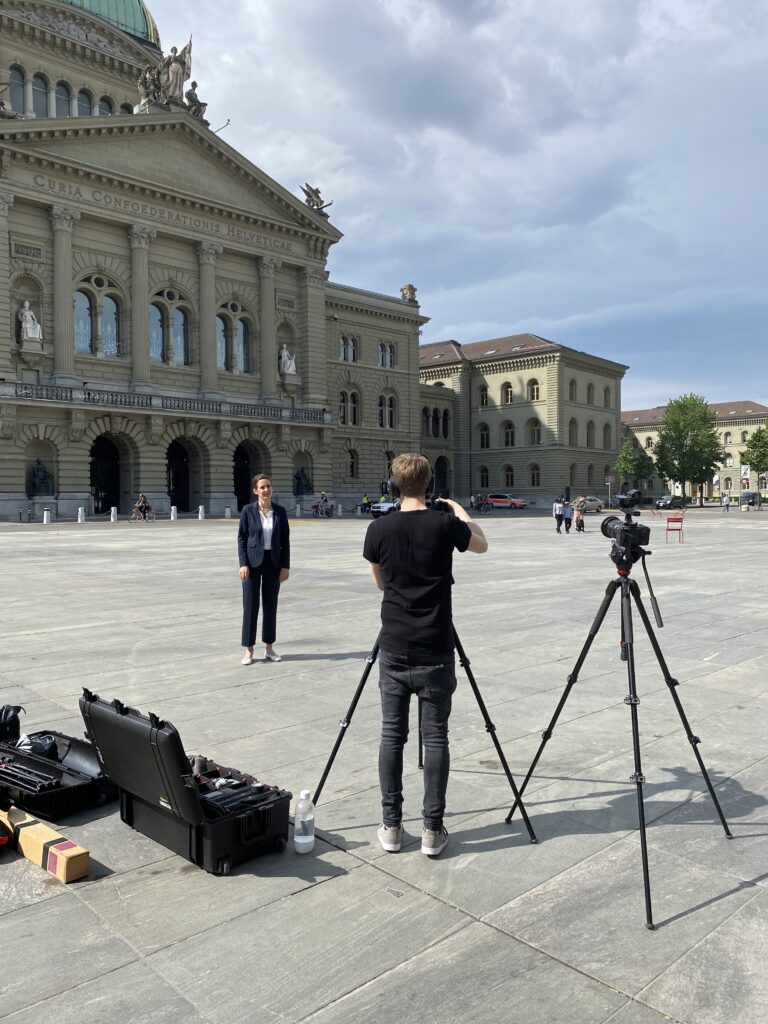During the COVID-19 pandemic, the Swiss National COVID-19 Science Task Force advised policymakers and informed the public about the latest scientific findings. ETH Zurich Professor Tanja Stadler was president of the Task Force from August 2021 until its termination in March 2022. In this video interview, Tanja explains her area research and the work of her group, and shares her experience with the Task Force. Her key learning is that we need institutionalized, robust connections from science to politics, in particular in non-crisis moments, because that would allow us on day one of a crisis to have a functional science-policy interface.
Crisis Response: The Critical Role of a Science-Policy Interface
by Viktoria Ivarsson, 1 September 2022
Edited Transcript:
I'm Tanja Stadler, I'm a Full Professor at ETH Zurich. In addition to this pure research, I was very active in the research-policy interface during the pandemic by being first a Member and then Head of the National COVID-19 Science Task Force advising the Swiss government. I’m based in Basel, in the Department of Biosystems Science and Engineering, where scientists work at the interface of biology, engineering and statistics to uncover fundamental processes in biology. My research group works on understanding evolutionary biology. Any one of us, all life on this planet, evolves, meaning over time there are little changes. This is over millions of years: species change, species come into existence, species die out, go extinct. And on a very fast scale, pathogens change. So viruses, bacteria, they change while they infect us. We are interested in understanding the processes of evolution from millions of years to a very fast evolution within weeks.
When the pandemic took off in early 2020, it was clear this virus which infects us, that will change. So it accumulates mutations. Every living system is composed or has a genetic code, and for SARS-CoV-2 those are 30,000 nucleotides. And we knew over the years to come this virus will stay with us, but it will change. From March 2020, we analyzed genomic sequencing data from the virus to understand how it's changing and detecting new variants of concern. We don't have clinical facilities, so we get from the medical experts clinical samples with the virus. They arrive here in our genomic facility and then they are preprocessed such that they can go in machines which overnight pretty much run and then give us for each sample this 30,000 nucleotide sequence. On our computer a few days after the sample is arriving, you can imagine we get a few hundreds of just sequences of 30,000 AGCTs (the nucleobases on the virus-RNA: A-adenine, G-guanine, C-cytosine, T-thymine), and then our goal is to extract from those sequences information.
Sometimes the mutations say, “on site 29,000 an A changed to a G.” And that's important for us to understand what's actually circulating, what viruses are around, and what will they cause, how severe of a disease. Generally, evolutionary biology is fundamental to any biology because only if we understand how we came about, how life came about, can we also understand what's happening next and in particular for pathogens, I guess as we have learned over the two years of the pandemic, only if you follow how the pathogen is changing do we actually understand, say, if a new variant arises, and we can then with modeling, say, project when this variant will become dominant and cause potentially waves of infection.
This information is crucial to policymakers to implement certain interventions to limit the height of the wave. I'm convinced that in order for the government to come up with the best decisions possible for the population, the country, it is crucial to have the evidence and the potential courses of action together with the consequences laid out transparently from the scientists. Here, we started the Task Force already when Switzerland was in a lockdown. So actually the science policy interface didn't work properly from the very start, but it needed time to evolve. And also once we were established, it wasn't right away a very functional and dynamic interaction. It took time to get the trust understanding from both sides. But then over the last year of the Task Force, I was able to experience that through listening, explaining, understanding. We got together to a better assessment of the situation so the policymakers could base their decisions upon the evidence.
What was very important in this process, I think, is also for us, the scientists, to understand what our role is. I think the job of science is to outline what is the data, what are the facts, and come up with courses of action. And then it's up to the politicians and in fact, society as a whole. We vote for the politicians to implement what society as the population wants. It's up to them to embed those courses of action into our values, which we have as a society. So put values on courses of action and thus come to a conclusion which decision makes most sense for the country. I think it's very important, and this pandemic showed that, that we as scientists have to put a lot of effort and increase our efforts to explain what science is doing, what we are doing to society, so that there is an understanding of what science can provide and also what science cannot provide. We cannot make decisions, but we can provide, “if you do decision A certain aspects could happen,” also associated with uncertainty. We cannot look into the future, but we can put data onto the current situation and predict what may happen in the future. This understanding in a society of what science can and cannot do, it's important to actually acknowledge, and appreciate the role of science in the whole science-policy interface.
When the pandemic took off in early 2020, it was clear this virus which infects us, that will change. So it accumulates mutations. Every living system is composed or has a genetic code, and for SARS-CoV-2 those are 30,000 nucleotides. And we knew over the years to come this virus will stay with us, but it will change. From March 2020, we analyzed genomic sequencing data from the virus to understand how it's changing and detecting new variants of concern. We don't have clinical facilities, so we get from the medical experts clinical samples with the virus. They arrive here in our genomic facility and then they are preprocessed such that they can go in machines which overnight pretty much run and then give us for each sample this 30,000 nucleotide sequence. On our computer a few days after the sample is arriving, you can imagine we get a few hundreds of just sequences of 30,000 AGCTs (the nucleobases on the virus-RNA: A-adenine, G-guanine, C-cytosine, T-thymine), and then our goal is to extract from those sequences information.
Sometimes the mutations say, “on site 29,000 an A changed to a G.” And that's important for us to understand what's actually circulating, what viruses are around, and what will they cause, how severe of a disease. Generally, evolutionary biology is fundamental to any biology because only if we understand how we came about, how life came about, can we also understand what's happening next and in particular for pathogens, I guess as we have learned over the two years of the pandemic, only if you follow how the pathogen is changing do we actually understand, say, if a new variant arises, and we can then with modeling, say, project when this variant will become dominant and cause potentially waves of infection.
This information is crucial to policymakers to implement certain interventions to limit the height of the wave. I'm convinced that in order for the government to come up with the best decisions possible for the population, the country, it is crucial to have the evidence and the potential courses of action together with the consequences laid out transparently from the scientists. Here, we started the Task Force already when Switzerland was in a lockdown. So actually the science policy interface didn't work properly from the very start, but it needed time to evolve. And also once we were established, it wasn't right away a very functional and dynamic interaction. It took time to get the trust understanding from both sides. But then over the last year of the Task Force, I was able to experience that through listening, explaining, understanding. We got together to a better assessment of the situation so the policymakers could base their decisions upon the evidence.
What was very important in this process, I think, is also for us, the scientists, to understand what our role is. I think the job of science is to outline what is the data, what are the facts, and come up with courses of action. And then it's up to the politicians and in fact, society as a whole. We vote for the politicians to implement what society as the population wants. It's up to them to embed those courses of action into our values, which we have as a society. So put values on courses of action and thus come to a conclusion which decision makes most sense for the country. I think it's very important, and this pandemic showed that, that we as scientists have to put a lot of effort and increase our efforts to explain what science is doing, what we are doing to society, so that there is an understanding of what science can provide and also what science cannot provide. We cannot make decisions, but we can provide, “if you do decision A certain aspects could happen,” also associated with uncertainty. We cannot look into the future, but we can put data onto the current situation and predict what may happen in the future. This understanding in a society of what science can and cannot do, it's important to actually acknowledge, and appreciate the role of science in the whole science-policy interface.
Behind the Scenes:
You can read the final report of the Swiss National COVID-19 Science Task Force here: https://sciencetaskforce.ch/wp-content/uploads/2022/06/AbschlussberichtSTF29Mar2022-DE_en_final.pdf
More About Tanja

Prof. Dr. Tanja Stadler
Tanja Stadler is a Full Professor at the Department of Biosystems Science and Engineering of the Swiss Federal Institute of Technology (ETH Zürich) in Basel. Further, Tanja was president of the Swiss National COVID-19 Science Task Force advising the Swiss government from August 2021 until its termination in March 2022.




